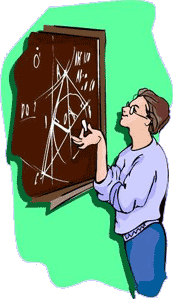Study Skill 1 - Good Listening In Class 
It is important for you to be a good listener in class. Much of what you will have to learn will be presented verbally by your teachers. Just hearing what your teachers say is not the same as listening to what they say. Listening is a cognitive act that requires you to pay attention and think about and mentally process what you hear.
Here are some things you should do to be a good listener in class.
 Be Cognitively Ready to Listen When You Come to Class. Make sure you complete all assigned work and readings. Review your notes from previous class sessions. Think about what you know about the topic that will be covered in class that day. Be Cognitively Ready to Listen When You Come to Class. Make sure you complete all assigned work and readings. Review your notes from previous class sessions. Think about what you know about the topic that will be covered in class that day.
 Be Emotionally Ready to Listen When You Come to Class. Your attitude is important. Make a conscious choice to find the topic useful and interesting. Be committed to learning all that you can. Be Emotionally Ready to Listen When You Come to Class. Your attitude is important. Make a conscious choice to find the topic useful and interesting. Be committed to learning all that you can.
 Listen with a Purpose. Identify what you expect and hope to learn from the class session. Listen for these things as your teacher talks. Listen with a Purpose. Identify what you expect and hope to learn from the class session. Listen for these things as your teacher talks.
 Listen with an Open Mind. Be receptive to what your teacher says. It is good to question what is said as long as you remain open to points of view other than your own. Listen with an Open Mind. Be receptive to what your teacher says. It is good to question what is said as long as you remain open to points of view other than your own.
 Be Attentive. Focus on what your teacher is saying. Try not to daydream and let your mind wander to other things. It helps to sit in the front and center of the class, and to maintain eye contact with your teacher. Be Attentive. Focus on what your teacher is saying. Try not to daydream and let your mind wander to other things. It helps to sit in the front and center of the class, and to maintain eye contact with your teacher.
 Be an Active Listener. You can think faster than your teacher can speak. Use this to your advantage by evaluating what is being said and trying to anticipate what will be said next. Take good written notes about what your teacher says. While you can think faster than your teacher can speak, you cannot write faster than your teacher can speak. Taking notes requires you to make decisions about what to write, and you have to be an active listener to do this. Be an Active Listener. You can think faster than your teacher can speak. Use this to your advantage by evaluating what is being said and trying to anticipate what will be said next. Take good written notes about what your teacher says. While you can think faster than your teacher can speak, you cannot write faster than your teacher can speak. Taking notes requires you to make decisions about what to write, and you have to be an active listener to do this.
 Meet the Challenge. Don't give up and stop listening when you find the information being presented difficult to understand. Listen even more carefully at these times and work hard to understand what is being said. Don't be reluctant to ask questions. Meet the Challenge. Don't give up and stop listening when you find the information being presented difficult to understand. Listen even more carefully at these times and work hard to understand what is being said. Don't be reluctant to ask questions.
 Triumph Over the Environment. The classroom may too noisy, too hot, too cold, too bright, or too dark. Don't give in to these inconveniences. Stay focused on the big picture - LEARNING. Triumph Over the Environment. The classroom may too noisy, too hot, too cold, too bright, or too dark. Don't give in to these inconveniences. Stay focused on the big picture - LEARNING.
Study Skill 2 - The RQWQCQ Strategy for Solving Maths Word Problem
The RQWQCQ is a good strategy to use when solving maths word problems. Each of the letters in RQWQCQ stands for a step in the strategy.

Read
Read the entire problem to learn what is it about. You may find it helpful to read the problem aloud, form a picture of the problem in your mind, or draw a picture of the problem.
Question
Find the question to be answered in the problem. Often, the question is directly stated. When it is not stated, you will have to identify the question to be answered.
Write
Write the facts that you need to answer the question. It is helpful to cross out facts presented in the problem that are not needed to answer the question. Sometimes, all of the facts presented in the problem are needed to answer the question.
Question
Ask yourself "What computations must I do to answer the question?"
Compute
Set up the problem on paper and do the computations. Check your computations for accuracy and make any needed corrections. Once you have done this, circle your answers.
Question
Look at your answers and ask yourself: "Is my answer possible?" You may find that your answer is not possible because it does not fit with the facts presented in the problem. When this happens, go back through the steps of RQWQCQ until you arrive at an answer that is possible.
Use RQWQCQ to help you solve maths problems correctly.
Study Skill 3 - The DETER Strategy for Taking Tests/Examinations
To do well on a test/exam, you must have good knowledge of the information that is being tested. But you must also have a strategy for taking the test/exam that allows you to show what you know. The DETER strategy can help you do your best on any test/exam. Each letter in DETER reminds you what to do.

D = Directions
 Read the test directions very carefully. Read the test directions very carefully.
 Ask your teacher to explain anything about the test directions you do not understand Ask your teacher to explain anything about the test directions you do not understand
 Only by following the directions can you achieve a good score on the test. Only by following the directions can you achieve a good score on the test.
 If you do not follow the directions, you will not be able to demonstrate what you know. If you do not follow the directions, you will not be able to demonstrate what you know.
E = Examine
T = Time
 Once you have examined the entire test, decide how much time you will spend on each item. Once you have examined the entire test, decide how much time you will spend on each item.
 If there are different points for items, plan to spend the most time on the itemsthat count for the most points. If there are different points for items, plan to spend the most time on the itemsthat count for the most points.
 Planning yourtime is especially important for essaytests where you must avoid spending so much time onone item that you have little time left for other test items. Planning yourtime is especially important for essaytests where you must avoid spending so much time onone item that you have little time left for other test items.
E = Easiest
 The second E in DETER reminds you to answer the items you find easiest first. The second E in DETER reminds you to answer the items you find easiest first.
 If you get stuck on a difficult item that comes up early in the test, you may not get to answer items that test things you know. If you get stuck on a difficult item that comes up early in the test, you may not get to answer items that test things you know.
R = Review
 If you have planned your time correctly, you will have time to review your answers and make them as complete and accurate as possible. If you have planned your time correctly, you will have time to review your answers and make them as complete and accurate as possible.
 Also make sure to review the test directions to be certain you have answered all items required. Also make sure to review the test directions to be certain you have answered all items required.
Using the DETER strategy will help you do better on tests and get better grades.
(Source: http://www.how-to-study.com/)
|